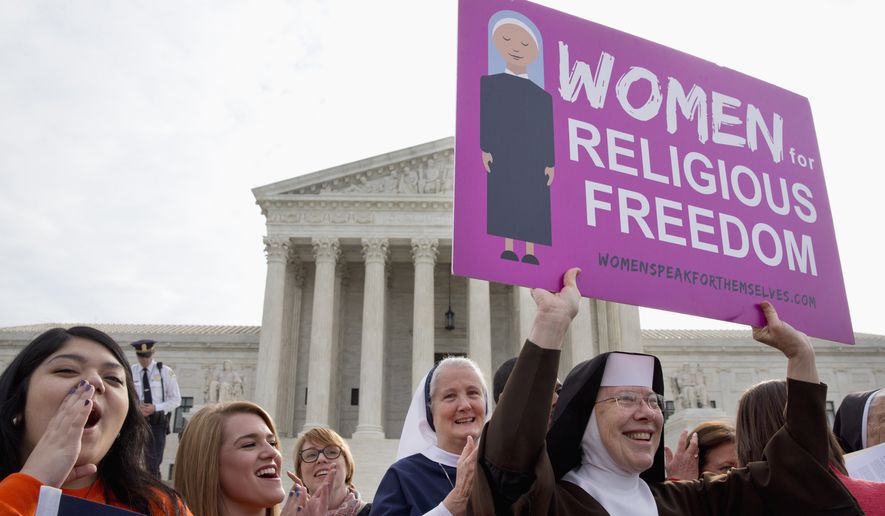The Supreme Court appears to be searching for a middle ground on the Obamacare contraceptive mandate, issuing an order Tuesday asking both the government and the religious charities challenging the rules to try to come up with options that can accommodate both sides.
In an unusual move, the justices, who heard oral argument in the case last week, asked both sides to submit additional briefs proposing ways that insurance companies could provide free contraception to female employees without their faith-based employers having to be involved.
The justices, in a two-page order, even suggested one possibility: having charities that object to contraception inform their insurers that they don’t want their plans to cover methods they oppose on religious grounds.
“[The nonprofits] would have no legal obligation to provide such contraceptive coverage, would not pay for such coverage, and would not be required to submit any separate notice to their insurer, to the federal government, or to their employees,” the court’s order said.
Insurance companies would then notify the employees directly that “the insurance company will provide cost-free contraceptive coverage, and that such coverage is not paid for by [the charities] and is not provided through petitioners’ health plan.”
Justices said they would welcome similar proposals as well. The court asked the attorneys to weigh in by April 12, and a decision in the case is expected by late June.
The contraceptive mandate is part of the Obama administration’s policies in carrying out Obamacare. The Health and Human Services Department said most employers must provide insurance that covers dozens of contraceptives approved by the Food and Drug Administration, including birth control pills and the morning-after pill, which some religions consider sinful.
Houses of worship were exempt from the mandate, but religious-based charities, including some private schools and Catholic hospitals, were not. Instead, the government offered an accommodation requiring the nonprofits to opt out of the coverage, which would trigger the insurers or the government to step in.
The Little Sisters of the Poor, an order of Catholic nuns dedicated to caring for the elderly, and a number of other charities said signing the form would make them complicit in providing contraceptives they object to.
During oral argument last week, liberal justices warned against allowing faith-based objections to stymie important government goals such as expanding access to women’s health care, while the court’s conservatives said Mr. Obama was hijacking the groups’ health care plans.
Both sides interpreted Tuesday’s order as a sign that the justices were taking their positions seriously.
“This is an excellent development. Clearly, the Supreme Court understood the Sisters’ concern that the government’s current scheme forces them to violate their religion,” said Mark Rienzi, lead counsel for the Becket Fund for Religious Liberty. “We look forward to offering alternatives that protect the Little Sisters’ religious liberty while allowing the government to meet its stated goals.”
The American Civil Liberties Union said it meant the justices were concerned about the consequences for women who could not get seamless coverage from their insurers.
Brigitte Amiri, a senior staff attorney at the ACLU, said the request seemed to narrow the scope of alternatives to those that use the employers’ existing insurers, “rather than alternatives that are unrealistic,” such as contraception-only plans that do not exist.
The death of Justice Antonin Scalia last month looms over the case. Without his vote, the religious feared the court would split 4-4.
That would force the court to either list the case for re-argument with a full slate of justices or leave the lower-court rulings in place, meaning that in some states religious nonprofits would have to sign the forms, while in other states they would be exempt.
The challenge centers on the Religious Freedom Restoration Act of 1993. That legislation, signed into law by President Clinton, said the government couldn’t burden someone’s religious exercise unless it could demonstrate that it was furthering a compelling government interest and doing it in the least restrictive way possible.
Justice Anthony M. Kennedy, the key swing vote, didn’t declare his leanings last week, though he seemed sympathetic to the nonprofits and pondered whether there was a better way to provide the drugs and services to their female employees.
During argument, the nonprofits’ attorneys said the government can provide contraceptives through its subsidized Obamacare exchanges or separate streams of federal funding.
“There is an easy solution: The government can offer these services to women who want them without forcing Christian schools, nuns and priests to abandon their belief that life is sacred,” said David Cortman, senior counsel for the Alliance Defending Freedom, which represents some of the nonprofits. “We will confer with our clients to determine a response to the Supreme Court’s request.”
Others felt the court’s proposal did not resolve the nonprofits’ core complaints about “complicity” in the coverage.
The nonprofits would still notify insurers that they object to contraceptive coverage, and the arrangement still relies on the employers’ plans, said Holly Lynch, a bioethics researcher at Harvard Law School who is closely tracking the debate.
“It may demonstrate, though, that [Justice] Kennedy is very worried about complicity,” she said, “and so the liberal block is trying to just do whatever it takes to get him on board.”
• Tom Howell Jr. can be reached at thowell@washingtontimes.com.




Please read our comment policy before commenting.